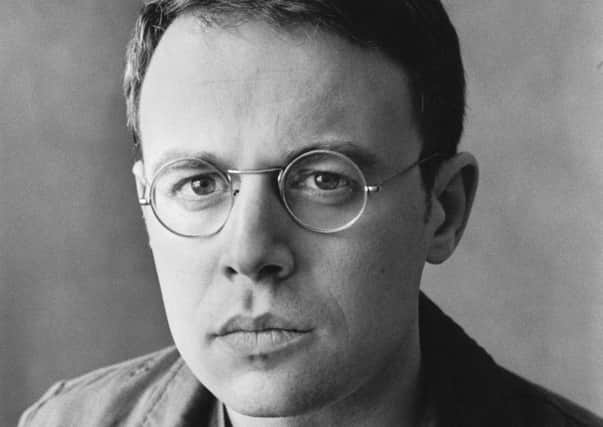Book review: Book of Numbers, Joshua Cohen


Book Of Numbers attempts to deal seriously with digital culture and how it is changing us, as the provocative opening sentence amply demonstrates. But although there are passages of brilliance – genius even – it somehow fails to become more than the sum of its parts and frequently irks rather than inspires.
The narrator of Joshua Cohen’s novel is a failed writer called Joshua Cohen. Approaching his 40th birthday, about to be divorced and dealing with his soon-to-be-ex-wife’s vengeful blog, his career was stymied by his debut being published on 10 September, 2001.
Advertisement
Hide AdEking out a living writing fake product endorsements and consumed with writerly jealously of his friend Caleb, things take an upward turn when he is asked to be the ghost-writer for a famous and enigmatic digital entrepreneur, coincidentally also called Joshua Cohen. This international figure – whose 40th birthday party is one of the book’s set pieces, and to which, of course, he does not turn up – is a kind of mélange of Steve Jobs, Larry Page, Mark Zuckerberg and Bill Gates. Indeed, there is a strange failure to suspend disbelief that “Tetration” – Cohen’s company – is anything other than Google.
In telling his life story, Cohen concentrates on the entrepreneur’s relationship with three people: Moe, a mysterious Indian programmer who links Buddhism to computing; the Machiavellian Kor, who helps to monetise the business; and Thor Ang Balk, an online whistleblower. Balk is clearly based on Julian Assange, down to his asylum in a foreign embassy and his extradition on sexual assault charges.
The more successful Cohen is depicted as borderline autistic, referring to himself in the first person plural and calling his parents “M-Unit” and “D-Unit”. The other Cohen, holed up in Dubai, Abu Dhabi, Paris and Frankfurt, struggles with his pornography fixation, Kor’s interference, his penchant for callipygian women wearing burqas, and writing the book in such a way that it is not a hagiography. The postmodernist “writer writing about writing” sub-genre strikes me as rather exhausted. That it is done so knowingly here comes across as arch rather than satirical.
Just before the central section, Writer-Cohen confides in the reader that he will not “tetrate” during the writing of the book: it will be a book about the digital world but not reliant on it. This leads to the second stylistic peculiarity. The interviews with Tech-Cohen are full of struck-out passages, notes from the writer to himself such as “[REWRITE]”. It gives the narrative an unfinished, temporary feel. Similarly there are emails and blogs reproduced full of typos and solecisms. It is a high-risk strategy to have the author criticising and pointing out his own weak prose – Gilbert Sorrentino managed it with the wonderful and under-rated Mulligan Stew – as there is every possibility the reader might just agree. One can see what Cohen was trying to do. In the age of the slick polish of an e-text, this harks back to the manuscript. The alterations and crossings-out are signs of authenticity. As he writes: “There’s something different about writing by hand again, something rebooting, refreshing, restoring, restorative… Computers keep total records, but not of effort, and the pages inked out by their printers leave none. Screens preserve no blemishes or failures. Screens preserve nothing human.”
What makes the novel’s failure all the more regrettable is that the actual narrative given by Tech-Cohen is actually fascinating. There are cadenzas on the nature of digital technology that are eloquent, surreal, insightful and moving. The damaged billionaire is convincing, a Howard Hughes figure in an increasingly networked world. I have rarely read such intricate expositions about the difference between the web and the net, search engines, the Y2K fiasco and the future of wearable, un-turn-off-able tech. The work has a lot of important things to say about the collusion between corporations and government, the erosion of privacy and the rise of state secrecy, and how “technology’s depriving our thoughts of freedom”. There is a kind of thriller plot in the machinations of Kor and the antagonisms with the eccentric Moe, but too often it is cluttered by more of Writer-Cohen’s meanderings.
There is one very telling moment where Tech-Cohen uses the acronym w/r/t (with reference to). To anyone with an interest in contemporary American fiction this is clearly recognisable as one of the prose tics of the late David Foster Wallace. What is it doing here? Is it a homage, with the author situating himself in the same tradition as Wallace’s Infinite Jest and The Pale King, two other encyclopaedic books about systems and messages? Or is it supposed to align the entrepreneur with Foster Wallace, a similarly autodidactic, troubled individual? Charitably one could suppose both.
Book Of Numbers is an interesting experiment, even if, in the final reckoning, it fails. Cohen obviously has the talent to write something remarkable. It is a pity this is not it.